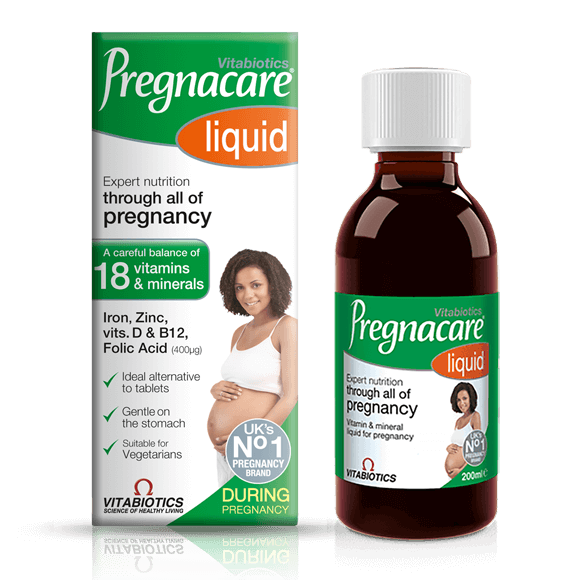Pregnacare Original
Expert nutrition for mother and baby
Pregnacare prenatal supplement is the most popular and trusted by mums to safeguard the diet of those who are planning for pregnancy or are already pregnant. A scientifically developed formulation of 19 important vitamins and minerals, Pregnacare contains 400µg folic acid and 10µg vitamin D, as advised by the UK Department of Health during pregnancy and breast-feeding. Pregnacare has been carefully developed by experts so that all ingredient levels are within safe levels for pregnancy and are moderate rather than excessive.
Recommended level of folic acid & vitamin D
The UK Department of Health recommends women planning a baby should take a supplement containing 400µg of folic acid from the start of trying to conceive until the 12th week of pregnancy. This is the exact amount of folic acid contained in Pregnacare. Supplemental folic acid intake increases maternal folate status†. Low maternal folate status is a risk factor in the development of neural tube defects in the developing foetus.Folic Acid is also beneficial beyond 12 weeks as it contributes to maternal tissue growth during pregnancy.
Important: Some pregnancy formulas do not include the exact 10 µg vitamin D, as advised by the UK Department of Health during pregnancy and breast-feeding.
More than folic acid alone - with B12 and key minerals
Many studies show the importance of ensuring the correct intake of various vitamins and minerals throughout the entire pregnancy and as part of an aftercare plan. Pregnacare provides a range of nutrients for overall support, all at sensible, carefully balanced levels, including vitamins B2, B6 and B12 which contribute to normal red blood cell formation.
Pregnacare avoids high dose iron which is not recommended
Unlike many prenatal iron supplements, Pregnacare has been specifically formulated with an ideal, moderate level of iron. High levels of iron are not recommended unless there is a particular requirement as identified by your healthcare professional.
Before conception
Pregnacare is recommended before conception to build up the stores of nutrients such as iron in women who are trying for a baby. Good nutrition is important to help prepare a woman's body for the additional demands placed on it during pregnancy. Certain nutrients, like folic acid, vitamin B12 and zinc are also of particular importance from the very first moment of conception. Zinc contributes to normal fertility and reproduction whilst vitamin B12 contributes to normal red blood cell formation and also has a role in the process of cell division.
For all of pregnancy
Good nutritional intake is vital throughout pregnancy, not just the first 12 weeks. Pregnacare provides essential nutrients throughout pregnancy including folic acid which plays an important role during the full nine months and contributes to normal blood formation. You can start taking Pregnacare at any point during pregnancy.
Specially formulated by experts
Pregnacare has been formulated by experts to help safeguard a mother's diet during pregnancy. It provides a comprehensive spectrum of essential nutrients at carefully chosen safe levels, developed on the basis of international research. It has always contained the recommended level of 400µg folic acid**. Pregnacare is proud to work in partnership with the Royal College of Midwives to support the health of mothers and babies by raising awareness of the benefits of good nutrition.
†The beneficial effect is obtained with a supplemental folic acid daily intake of 400µg for at least one month before and up to three months after conception.
** Folic acid contributes to maternal tissue growth during pregnancy. Pregnacare has always contained 400µg folic acid, the level recommended for all women from the start of trying to conceive until the 12th week of pregnancy.
This information is not intended to be a substitute for professional medical advice, diagnosis, or treatment. Always seek the advice of your physician or other qualified health professionals regarding any medical condition.











